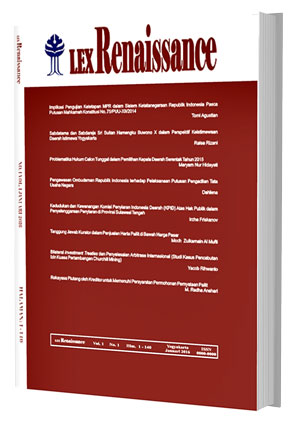Main Article Content
Abstract
Keywords
Article Details
Authors who publish with this journal agree to the following terms:
a. Authors retain copyright and grant the journal right of first publication with the work simultaneously licensed under a Creative Commons Attribution License that allows others to share the work with an acknowledgement of the work's authorship and initial publication in this journal.
b. Authors are able to enter into separate, additional contractual arrangements for the non-exclusive distribution of the journal's published version of the work (e.g., post it to an institutional repository or publish it in a book), with an acknowledgement of its initial publication in this journal.
c. Authors are permitted and encouraged to post their work online (e.g., in institutional repositories or on their website) prior to and during the submission process, as it can lead to productive exchanges, as well as earlier and greater citation of published work (See The Effect of Open Access).References
- Buku
- Fajar, Mukti dan Yulianto Achmad, Dualisme Penelitian Hukum: Normatif & Empiris, Pustaka Pelajar, Yogyakarta, 2010.
- Ibrahim, Johnny, Teori dan Metodologi Penelitian Hukum Normatif, Bayumedia Publishing, Malang, 2008.
- Kartadjoemena, H.S., GATT, WTO dan Hasil Uruguay Round, UI Press, Jakarta, 2007.
- van den Bossche, Peter, Daniar Natakusumah dan Joseph Wira Koesnaidi., Pengantar Hukum WTO (World Trade Organization), Yayasan Obor Indonesia, Jakarta, 2010.
- van den Bossche, Peter dan Werner Zdouc, The Law and Policy of the World Trade Organization: Text, Cases and Material, Cambridge University Press, Cambridge, 2017.
- Jurnal
- Kennedy, Kevin C., “Resolving International Sanitary and Phytosanitary Disputes in The WTO: Lessons and Future Directions”, Food and Drug Law Journal, Vol. 55, 2000.
- Laidlaw, Anais Kedgley, “Is it Better to be Safe than Sorry? The Cartagena Protocol versus The World Trade Organisation”, Victoria University of Wellington Law Review, 2005.
- Risnain, Muh., “Politik Hukum Perlindungan Industri dalam Negeri Indonesia dalam Menghadapi Perdagangan Bebas”, Fiat Justisia Jurnal Ilmu Hukum, Vol. 5 No. 3, 2011.
- Sudradjat, Eko Prilianto, “Penerapan WTO-Agreement on The Application of Sanitary and Phytosanitary Measures: Analisis Tentang Penerapan Public Health Security And Bioterrorism Preparedness And Response Act Of 2002 oleh Amerika Serikat”, Jendela Informasi Hukum Bidang Perdagangan, 2012
- Wartini, Sri, “Implementasi Prinsip Kehati-hatian dalam Sanitary and Phythosanitary Agreemant, Studi Kasus: Keputusan Appellate Body WTO Dalam Kasus Hormone Beef Antara Uni Eropa Dengan Amerika Serikat”, Jurnal Hukum, Vol. 14 No. 2, 2007.
- Peraturan Perundang-Undangan, Dokumen, dan Perjanjian Internasional
- Agreement on The Application of Sanitary and Phytosanitary Measures Dokumen Permohonan Konsultasi WTO No. WT/DS484/1
- Dokumen Permohonan Pembentukan Panel WTO oleh Brazil No. WT/DS484/8 Dokumen Permohonan Konsultasi WTO No. WT/DS506/1
- Internet
- Departemen Pertanian, Perikanan, dan Kehutanan Australia, “Kesepakatan Organisasi Perdagangan Dunia (WTO) tentang Sanitari dan Fitosanitari”, http://www.agriculture.gov.au/SiteCollectionDocuments/languages/indonesian/piaph/sp s_booklet_bahasa.pdf
- Ika, Aprillia, “Brasil Gugat Indonesia Terkait Syarat Importasi Daging dan Produk Ayam yang Halal”, http://ekonomi.kompas.com/read/2016/10/15/ 100000826/brasil.gugat.indonesia.terkait.syarat.importasi.daging.dan.produk.ayam.yang.halal.
- World Trade Organization, “DS484 : Indonesia¬ – Measures Concerning the Importation of Chicken Meat and Chicken Products”, https://www.wto.org/english/tratop_e/dispu_e/cases_e/ds484_e.htm
References
Buku
Fajar, Mukti dan Yulianto Achmad, Dualisme Penelitian Hukum: Normatif & Empiris, Pustaka Pelajar, Yogyakarta, 2010.
Ibrahim, Johnny, Teori dan Metodologi Penelitian Hukum Normatif, Bayumedia Publishing, Malang, 2008.
Kartadjoemena, H.S., GATT, WTO dan Hasil Uruguay Round, UI Press, Jakarta, 2007.
van den Bossche, Peter, Daniar Natakusumah dan Joseph Wira Koesnaidi., Pengantar Hukum WTO (World Trade Organization), Yayasan Obor Indonesia, Jakarta, 2010.
van den Bossche, Peter dan Werner Zdouc, The Law and Policy of the World Trade Organization: Text, Cases and Material, Cambridge University Press, Cambridge, 2017.
Jurnal
Kennedy, Kevin C., “Resolving International Sanitary and Phytosanitary Disputes in The WTO: Lessons and Future Directions”, Food and Drug Law Journal, Vol. 55, 2000.
Laidlaw, Anais Kedgley, “Is it Better to be Safe than Sorry? The Cartagena Protocol versus The World Trade Organisation”, Victoria University of Wellington Law Review, 2005.
Risnain, Muh., “Politik Hukum Perlindungan Industri dalam Negeri Indonesia dalam Menghadapi Perdagangan Bebas”, Fiat Justisia Jurnal Ilmu Hukum, Vol. 5 No. 3, 2011.
Sudradjat, Eko Prilianto, “Penerapan WTO-Agreement on The Application of Sanitary and Phytosanitary Measures: Analisis Tentang Penerapan Public Health Security And Bioterrorism Preparedness And Response Act Of 2002 oleh Amerika Serikat”, Jendela Informasi Hukum Bidang Perdagangan, 2012
Wartini, Sri, “Implementasi Prinsip Kehati-hatian dalam Sanitary and Phythosanitary Agreemant, Studi Kasus: Keputusan Appellate Body WTO Dalam Kasus Hormone Beef Antara Uni Eropa Dengan Amerika Serikat”, Jurnal Hukum, Vol. 14 No. 2, 2007.
Peraturan Perundang-Undangan, Dokumen, dan Perjanjian Internasional
Agreement on The Application of Sanitary and Phytosanitary Measures Dokumen Permohonan Konsultasi WTO No. WT/DS484/1
Dokumen Permohonan Pembentukan Panel WTO oleh Brazil No. WT/DS484/8 Dokumen Permohonan Konsultasi WTO No. WT/DS506/1
Internet
Departemen Pertanian, Perikanan, dan Kehutanan Australia, “Kesepakatan Organisasi Perdagangan Dunia (WTO) tentang Sanitari dan Fitosanitari”, http://www.agriculture.gov.au/SiteCollectionDocuments/languages/indonesian/piaph/sp s_booklet_bahasa.pdf
Ika, Aprillia, “Brasil Gugat Indonesia Terkait Syarat Importasi Daging dan Produk Ayam yang Halal”, http://ekonomi.kompas.com/read/2016/10/15/ 100000826/brasil.gugat.indonesia.terkait.syarat.importasi.daging.dan.produk.ayam.yang.halal.
World Trade Organization, “DS484 : Indonesia¬ – Measures Concerning the Importation of Chicken Meat and Chicken Products”, https://www.wto.org/english/tratop_e/dispu_e/cases_e/ds484_e.htm




